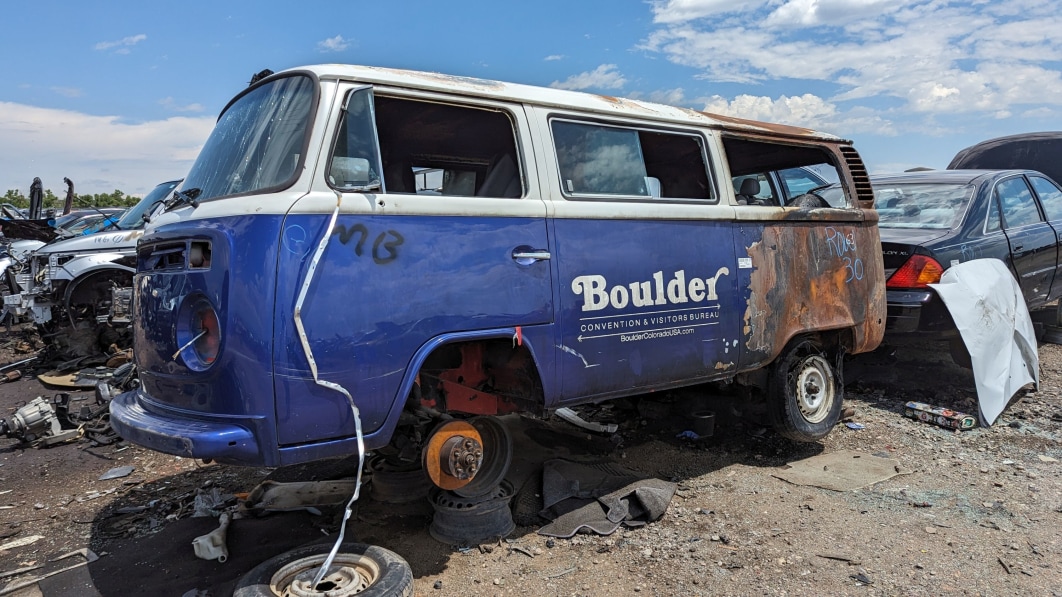The second generation of the Volkswagen Transporter, sold in the United States from 1968 to 1979, has become too valuable for financially struggling hippies to own. As a result, prices have increased, preventing most worn-out examples from ending up in car graveyards. In the past 16 years, I have only come across a stripped ’71 model and a damaged ’78 model prior to the bus I found today, which unfortunately met its demise due to a fire. Before delving into the sad part of this story, let’s discuss the Transporter’s previous role during happier times. It was owned by the Boulder Convention & Visitors Bureau, likely due to Boulder’s reputation as a sanctuary for VW Bus-loving hippies (or at least it was known for that when genuine hippies, rich in principles but poor in finances, could afford to live there). The BC&VB possesses a beloved orange second-gen Transporter named Delilah, equipped with a photo booth that can be rented for events. I couldn’t find much online evidence of Delilah’s blue sibling. There’s a 2018 Instagram post showcasing this bus on the University of Colorado campus, as well as a Facebook post from the same year by the BC&VB asking for suggestions to name the blue bus. Violet, Blueberry, Moonbeam, Indigo, and Pearl were among the possibilities. Perhaps this van burned shortly after that and spent five years waiting for repairs that never materialized. I considered contacting the BC&VB to inquire about this VW but decided against it, not wanting to bring up the painful subject of Delilah’s deceased companion. While I celebrated the destruction of an orange second-gen Transporter (by a Caterpillar D9) as an official of the 24 Hours of Lemons in 2009, I understand how someone could become attached to a T2 Transporter that wasn’t a clattering, deteriorating rust bucket. I’ve owned a couple of air-cooled Beetles and have heard of several owned by friends that burned down to ashes. Back in the days when air-cooled VWs were a common sight on American roads (from the mid-1950s to the early 1990s), fires involving these cars were quite frequent. This was due to the design of Ferdinand Porsche’s affordable 1930s technology. The cylinders and cylinder heads of these engines would become extremely hot, and the constant vibration of the engine would cause the fuel lines and filter to jiggle at the same time that the flexible fuel hoses deteriorated in the sweltering heat of the engine compartment. Consequently, gasoline would spill onto the hot engine parts, igniting a fire. Sometimes, the heat would cause the oil cooler to burst, adding more fuel to the inferno. By the time the driver realized what was happening, it was usually too late, and all they could do was pull over, get out, and watch helplessly as the flames engulfed the entire vehicle. Surprisingly, it was possible to purchase a new 1978 Volkswagen Transporter with a three-speed automatic transmission, which is what this van had. With its 2.0-liter boxer-four engine producing just 67 horsepower and 101 pound-feet of torque, most buyers opted for the four-speed manual. The manufacturer’s suggested retail price (MSRP) for this van with automatic transmission would have been $7,420, equivalent to approximately $36,223 in 2023. When this van was new in 1978, minivans were still a few years away, meaning there weren’t many mainstream options available for American shoppers looking for a small, fuel-efficient van. The Volkswagen Vanagon became available in the United States starting with the 1980 model year. Initially, the Vanagon featured an air-cooled engine, which was later replaced by a water-cooled version in 1983. Sales of the Vanagon in the US continued until 1991, with the Eurovan taking its place in 1993. When it comes to station wagons, taking the bus is more enjoyable!

Classic Find: 1978 Volkswagen Transporter in the Junkyard
Denial of responsibility! Swift Telecast is an automatic aggregator of the all world’s media. In each content, the hyperlink to the primary source is specified. All trademarks belong to their rightful owners, all materials to their authors. If you are the owner of the content and do not want us to publish your materials, please contact us by email – swifttelecast.com. The content will be deleted within 24 hours.
